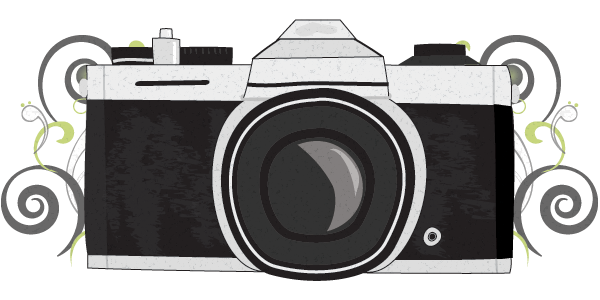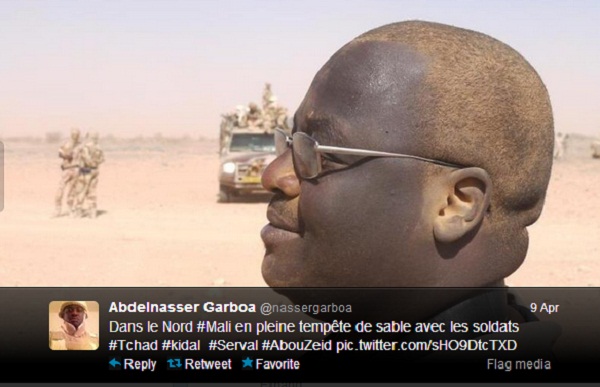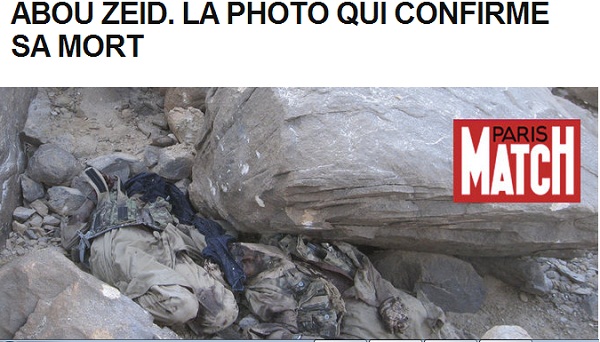Abdel-Nasser Mahamat Ali Garboa alias Abdelnasser Garboa is a Chadian journalist covering the war in Mali. He was the one who took the picture of the remains of Abu Zeid and and he shared it on Twitter . But for him, covering a war is not always easy especially when you are embedded with the army of your country.
So I would have liked to know a little more about you, your journalistic career, and how did you find yourself covering the war in Mali?
From the first day of my writings, I decided to take the name of Abdelnasser Garboa. I started journalism at the age of 19 years to the only daily newspaper in Chad, “Le Progrès” which belongs to one of my uncles, Mahamat Hissene. In 2000 I entered the University of Ngaoundere in Cameroon to study law. While I was in second year, the lure of journalism attract me towards writing the first Cameroonian private daily “Mutations”. Mutations had passed the daily periodicity and was searching correspondents in the north of the country was covered by very few private media. It was in March 2002. I then covered restructuring operations bases organs of the ruling party, the Cameroon People’s Democratic Movement (CPDM). In 2005, Chad was then faced with the rebel army who swore to have the skin of President Idriss Déby. Not wanting to settle for terse press the Government on the balance sheets of battles, unmet also small visits to battlefields after a confrontation. I ask the Minister of National Defence at the time, General Bichara Issa Djadallah, to incorporate me in a combat unit leaving for the East. He became my request and allow me to embark with General Daoud Abakar Abdelkerim Kareinkeïno alias, one of the most iconic warlords Chad. He was Director General of the Gendarmerie. This was my first experience of war coverage. I spent three months with them to skim the areas east of the country behind the elements of the United Front for Change and those of the Union of Resistance Forces. This experience gave me a better understanding. I first learned about the geography of this part of the country almost every bastion of rebellion. I got to know our soldiers and to appreciate them. I also learned to understand the issues, people and practices of this bloody conflict. My way ofdealing with this conflict of information has completely changed. My greatest gain is to know what it looks like when you talk about movement forces belligerence. It was a unique experience. Regarding the war in Mali, the first day of the announcement of the entry of our troops in action I thought that I should do something. I went to the Ministry of National Defense and then to the General Staff of the Armed Forces to cover how to deploy our units. I was the first to interview the commandant of forces and the one of the operations. During the creation of a pool of journalists to support our troops, I volunteered and then, the adventure began. For me, journalism is always synonymous with great coverage and extensive survey.
My other question relates to your use of Twitter and social networks in general: how do you use it?
I admit, that before the war in Mali, I used very little Twitter, I was much more on Facebook where I shared stuff with friends in France, Cameroon and the rest of the world. The need of Twitter came when I started covering Mali. I found there was a lack of information onthe operations of Chadian soldiers on the ground. While our forces Gao jumped on, no French press mentioned it. There was a total blackout maybe because it is the will of the French General Staff that put forward the French and Malian soldiers. But when I arrived in Gao on January 27, there was no Malian soldier in this city. It was sickening for Chadians. It was the same when we arrived in Menaka, and into Kidal. No communication as made on the operation of Chadian soldiers. So Chadian journalists decided to redress this imbalance. The problem is that the state media is not very credible in the eyes of many people. So I tried to give a different look. But I do admit that is a subjectiv point of view since I fully support the operation of Chadian soldiers and I will ensure that no information that would undermine the moral of the troops is released. In these kinds of operation must be very careful. I respect the facts, but the role of the army is crucial.
When you posted the picture of what is believed to be Abu Zeid’s dead body, did you know the impact it would have?
I knew that Abu Zeid was a wanted emir and that his picture would be an important shot. But the impact of its propagation was beyond my imagination. There was an unecessary controversy created by Le Drian about the reliability of it. Many of my fellow did not like the dismissive attitude of the French minister.
But how did you know it was him?
Why would I not believe a soldier who descends from a mountaintop claiming to have killed Abu Zeid and showing a photo of his corpse? Does my support to these soldiers is worse than the French or American press for their soldiers in Afghanistan or Iraq? More, who dared to ask for a DNA test to the USA following the assassination of Bin Laden? It was not difficult to identify Abou Zeid. His dead corresponded to the pictures of him circulating on the net. I trust my senses more than anything else. And in the end, François Hollande gave me reason but after twenty days.
You said you offered more a subjective point of view, but until which point ? How do you remain neutral when you are “embedded” with the Chadian army representing your country?
To support an operation does not mean we should distort information. I try to just report the facts. I do not want to dig up dirt at ay price. I report what I see and what I hear, officially. It must be remembered that our confines are also shared by all our French colleagues when they cover the war of their soldiers. It’s very strict and controlled. Of course, we must not fall into war propaganda. But I think some stories deserve to be told later, at the end of the conflict, with more details.
What do you think of the war in Mali coverage in foreign media?
Foreign media are very far from the ground. France wanted a clean and mute war. They sendreporters to cover patrol missions and not real combat operation. We have an advantage as Chadian journalists to be able to cover Chadian soldiers conducting raids on the ground in direct contact. This is essential to publicize these conflicts. We have great images that we can’t all broadcast for obvious reasons.
NB: Today, there are still doubts about the killing of Abu Zeid even if he has been replaced by AQIM. According to the Long war journal, AQIM has neither denied nor confirmed Abu Zeid ‘s death.
Interview by Lilia Blaise


